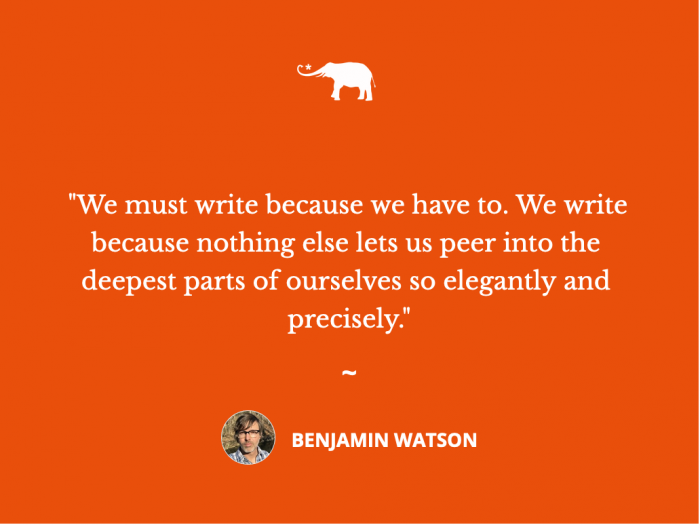Writers like to write about how writing is synonymous with torture from the Middle Ages, a spiritual rack or Iron Maiden their brilliance has forced upon them.
Each word they pluck from their brilliant brains requires hard minutes—hours perhaps—of profound and overwhelming thought. The writer is deep in the coal-mine of their consciousness, waiting for the dirt ceiling to collapse or the canary to die of asphyxiation.
Writers act as if the act of writing is an unimaginable excruciation—a horrific amalgamation of creativity and looking straight into the depths of their own exclusive hells—of which the Muggles who don’t write will never understand.
I disagree.
Do you know what is excruciating? My first job, when I was 16, washing dishes in an always busy college-town diner, during the summer in a kitchen with no fans or AC, where the plates and pans never stopped coming, and the cooks yelled at you for being stupid, and the waitresses yelled at you for being slow, and at the end of the night there were pans three feet long coated in thick bacon grease that needed to be washed, and you were so hot and greasy and tired, and all you wanted to do was listen to Led Zeppelin and kiss your first girlfriend under the star-strewn summer sky.
The hot, dirty jobs that everyday people work every day—that is excruciating. Sitting at your kitchen table trying to type something cool into your iMac as you pensively sip on your coffee—that is joy.
Writing requires thought and concentration and stillness and a willingness to spelunk the dark caverns of your soul, for sure. But if you are a writer, that is why you write. You write because you want to figure yourself out—you want to figure the world out. And you want to write a sentence that is true and lovely and may help someone else feel less alone—just like your favorite writers did for you.
No one is telling you you have to write. Writing is a privilege. Writing is a first-world problem. Writers write because they have to. They love to complain about it, but they are compelled to do it. Writers are the best whiners ever created. Do you hear marathoners, musicians, or meditation practitioners complain about doing the thing they are compelled to do? No. They just happily do it. Writers, goddesses bless us, love to act as if someone has a gun to our head, forcing us to purge these incredible words of wisdom the world waits upon.
This brings me to my main point: the writing is not the terrible part. The terrible part is being a writer—rather, wanting, needing, to be a writer.
Ever since I won the Golden Pen Award in elementary school for being the “best” creative writer at the school, I have had that burning writing itch no cream will subdue. I have written—of course—reams of poetry. I have written many short stories. I have written four novels, one of which I published through a print-on-demand many years ago and which tanked immediately. It was published with a paragraph missing from the second to last page—a paragraph that tied things all together—and I had neglected to do a final careful read-through. It was also quite, uh, racy, as I was deep in a Henry Miller phase, and quite embarrassing to have my relatives read it (and, of course, only relatives read it because it was printed on demand).
I have gone through months and a year here or there where I write almost nothing. I come to points where I just have nothing left to say. Yet like a person trying to give up dating forever, who meets a person at a party who smells excellent and they feel that frothy chemistry with, I just can’t seem to give up the erotic satisfaction of putting some more goddam sentences into the world.
The last long break in which I gave up writing was after my mom died in 2018. I just felt pretty numb for a while and was tired of trying to compose deep or lovely or true paragraphs or poems. I just wanted to live. I didn’t want to write about living. I wanted to be like an animal, experiencing simple, earthy realities without all the mastication and mindfulness writing requires.
We writers are often living two lives: the life lived, and the life constantly reviewed and picked apart for juicy nuggets of insight and unique perspectives.
“Ah-ha,” we think, “There’s a thought or sentence or concept that no one has written in just the way I did! I matter! I am unique! I, amongst the seven billion bodies on this planet, have done something special!”
Writing can be a real trap for the ego. We write because we want to know ourselves better, yet this can be an Alice-in-Wonderland-sized hole of excessive self-awareness and navel-gazing until you feel haunted by the white rabbit of consciousness always breathing down your neck. We write because we want to give something good to the world, yet the desire to be a poet, an artist, a “literary lion” can become a race for achievement, and recognition, and love.
If I publish something great, and the world responds with handclaps, I can finally, truly, love and accept myself. My neurosis and almost crippling self-consciousness, my challenges fitting into “normal” society, will now be justified: yes, he’s a bit eccentric, he’s been underemployed most of his life, but he’s a writer, after all. He’s special.
After taking that break from writing after my mom’s death and imagining I would never really write much again after 30 years of it, I suddenly was inspired to change gears and stop banging my head over fiction. I never really loved writing fiction, I realized. I got bored with plots, and dialogue, and complicated characters—I didn’t really like anything about fiction except trying to write interesting, Nabokovian sentences. So I began to write a book about what it means to create soul in our daily lives—to bring raw awareness and authenticity and heart into all aspects of our humanity. This was the topic I had wanted to write about for 30 years.
I wrote the book; I rewrote it; I edited it. I poured over the Writer’s Market and sent it out to agents specializing in spiritual topics and memoirs. Crickets. I sent it out to new-age publishers. Nothing. I was told you must have your own social media platform before they want to deal with you. I tried to get that going and began to feel like a common salesman, using “profound” self-written memes to gain traffic and impress the agents and publishers. It just wasn’t me.
Well-meaning friends and relatives would say, “Hey, just write another book! Just keep writing!” Yet, I didn’t spend a year writing this book to move on and write another that would possibly also never be published. I had done that enough. So I sit at a crossroads, waiting for literary fairs to start again, and perhaps I can meet some agents at one of those, press the flesh, and smile charmingly, wearing my best author-y outfit.
In the meantime, I publish the occasional essay (such as this) and laugh at my own impressive ability to turn anything into a problem. After my last essay was published on a site’s Instagram page and possibly read by thousands, I celebrated with bourbon and the excitement of loved ones. And then, I realized that almost every day, another article is posted by the same site, also with thousands of readers. Just like everything else, time moves on, and your moment in the sun in the hyperspeed of 2021 is but a second.
Like most writers, I always wanted to write my own version of On the Road, or To the Lighthouse, or When Things Fall Apart—a book that would last. A book that had the truth and depth and life to imbed itself into the culture, and survive its original generation of birth. A book that helped people to discover themselves. I wanted to write a book that awkward college students would carry in their NPR tote bags and read under trees, underlining their favorite sentences.
When I go into a bookstore and see the dozens of new books that come out every week or see the clearance section of books that sank like stones, or the genre writers who publish dozens of ghostwritten books with seemingly little interest in touching people’s souls in any way, I get damn depressed.
But that’s okay. I don’t trust a writer who doesn’t get depressed. For now, I am blessed to be able to publish my little essays. I am blessed to have the free time and space to write. I am blessed to have had anyone not genetically connected to me read my writing and respond with kindness. We writers, stuck in the limbo of small publishing experiences here and there, we must practice hard at relinquishing our ego, our expectations.
We must write because we have to. We must write because nothing else lets us peer into the deepest parts of ourselves so elegantly and precisely. We write because it helps us to touch the sacred we experience in our lives and turn it into something tangible, usable, real. Finally, we must write because nothing else feeds our souls with as much nourishment. When we write, we are ingesting spiritual spinach like Popeye, our metaphorical forearms popping out with muscles and strength. There is no substitute. Once you have experienced the singular pleasure of writing a sentence you love that articulates the you you have been trying to discover your whole life, no other food will quite do.
Besides, it feels pretty good to tell people at cocktail parties that you have your day job, and also, you casually mention, you are a writer. If you are a writer, this can feel like telling people, in a humble, sotto voice, that you are a wizard.
“Yes,” we think to ourselves, “I create magic with nothing but the tapping of my fingers; it’s just what I do—no big deal.”









Read 10 comments and reply